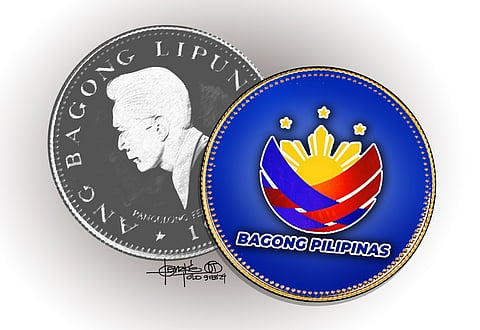
- NEWS
- the EDIT
- COMMENTARY
- BUSINESS
- LIFE
- SHOW
- ACTION
- GLOBAL GOALS
- SNAPS
- DYARYO TIRADA
- MORE

In Philippine politics, echoes of the past often reverberate through the corridors of power, shaping the trajectories of governance and policy.
One such resonance is evident in the Bagong Pilipinas initiative spearheaded by President Bongbong Marcos Jr., which bears striking similarities to the Bagong Lipunan movement initiated by his father, Ferdinand Marcos Sr.
The parallels between the two initiatives highlight their shared ethos of transformation, which cannot be totally ignored.
Ferdinand Marcos Sr.’s ascent to power in 1965 heralded a new era in Philippine politics, marked by the proclamation of the Bagong Lipunan (New Society).
Anchored on the promise of socio-economic reform and national development, the movement sought to modernize Philippine society through ambitious infrastructure projects, agrarian reform, and centralized governance.
Under the banner of martial law, Marcos Sr. implemented sweeping changes, consolidating power and reshaping the political landscape in ways that would have far-reaching consequences for decades to come.
Central to the Bagong Lipunan movement was the consolidation of power in the hands of the state, with Marcos Sr. assuming authoritarian control under martial law. This authoritarian streak facilitated rapid decision-making and the implementation of reforms but also led to widespread human rights abuses and political repression.
For sure, most of those in that generation still vividly remember the message of government propaganda anent the New Society broadcast on television stations following the declaration of Martial Law in 1972: You are the new Filipino. Confident of your rights. Respectful of the rights of others and certain that justice will prevail.
The intention, we were made to believe, was that the New Society would have employed socialist methods to ready the country for industrialization. We should know by now that it was only meant to justify the imposition of Martial Law, as the older Marcos lacked the political will to get the plan working.
He was married to a Romualdez, part of the land-owning principalia. His son, Bongbong, the concurrent president, and his daughter Irene would later follow Marcos Sr.’s footsteps and marry into the rich landed principalia of the Araneta clan.
The Bagong Lipunan agenda prioritized economic development, with emphasis on infrastructure projects, industrialization, and agrarian reform. Marcos Sr. envisioned a modern, industrialized Philippines, fueled by state-led initiatives and foreign investment.
It also espoused a brand of nationalism that emphasized Philippine sovereignty and cultural identity.
Marcos Sr. promoted a sense of national pride while simultaneously leveraging nationalist rhetoric to justify his authoritarian rule.
Fast forward to the present, and the echoes of the Bagong Lipunan movement resonate in the Bagong Pilipinas initiative spearheaded by his son, the current tenant of Malacañang.
While distinct in its contemporary context, PBBM’s initiative draws inspiration from his father’s legacy, seeking to reignite the spirit of transformation and modernization in Philippine society.
Like his father, President Bongbong Marcos Jr. exhibits authoritarian tendencies, advocating for strong leadership and centralized governance. While operating within the bounds of democracy, his vision for a “strong republic” echoes the authoritarian underpinnings of the Bagong Lipunan movement.
The Bagong Pilipinas initiative places a strong emphasis on economic development, echoing the economic ambitions of the Bagong Lipunan movement. Marcos Jr. envisions an economically vibrant Philippines, leveraging infrastructure projects, investment incentives, and technological innovation to propel the nation forward.
Central to the Bagong Pilipinas initiative is a narrative of national renewal and identity. Marcos Jr. invokes the legacy of his father’s nationalist rhetoric, positioning himself as a champion of Philippine sovereignty and cultural heritage in the face of external pressures and challenges.
However, unlike the authoritarianism of the Marcos Sr. era, the Bagong Pilipinas initiative operates within the framework of democracy, albeit with a strong executive leadership. Marcos Jr. seeks to balance the need for strong governance with respect for democratic institutions and principles.
In contrast to the divisive legacy of the Marcos Sr. regime, the Bagong Pilipinas initiative seeks to reconcile past grievances and foster national unity. Marcos Jr. emphasizes the need for healing and reconciliation, presenting himself as a unifying figure capable of bridging the divides of the past.
While drawing inspiration from the transformative ethos of the past, the PBBM initiative adapts to the realities of the present, reflecting the evolving aspirations and challenges of Philippine society.
Whether it heralds a genuine renewal or merely a reimagining of the past remains to be seen, but its echoes of history serve as a poignant reminder of the enduring influence of the past on the present.
